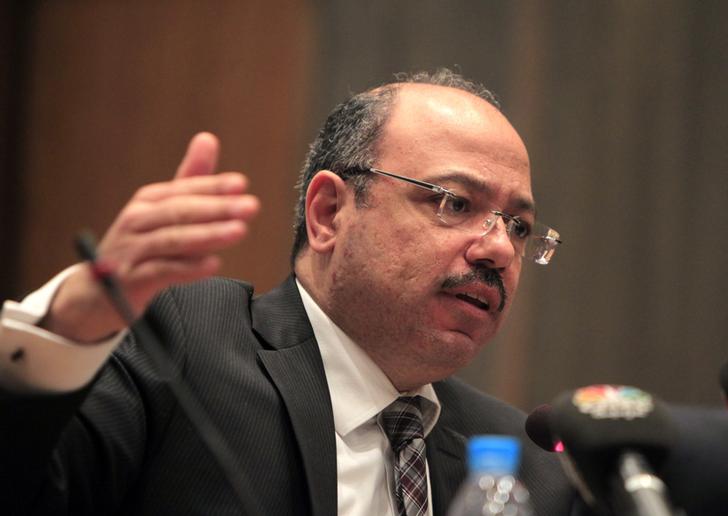Latest NEWS
- Aswat Masriya, the last word
- Roundup of Egypt's press headlines on March 15, 2017
- Roundup of Egypt's press headlines on March 14, 2017
- Former Egyptian President Hosni Mubarak to be released: lawyer
- Roundup of Egypt's press headlines on March 13, 2017
- Egypt's capital set to grow by half a million in 2017
- Egypt's wheat reserves to double with start of harvest -supply min
- Roundup of Egypt's press headlines on March 12, 2017
Finance minister hopeful reforms can revive Egyptian economy

Dimian talks during a news conference in Cairo March 12, 2014. REUTERS/Mohamed Abd El Ghany
By Michael Georgy and Stephen Kalin
CAIRO (Reuters) - Egypt will press ahead with plans to cut costly energy subsidies and introduce further tax reforms to boost the economy and halve the budget deficit within seven years, the country's finance minister said on Tuesday.
President Abdel Fattah al-Sisi raised fuel prices by up to 78 percent shortly after taking office in June -- a politically-sensitive step that his predecessors had shunned.
Finance Minister Hany Kadry Dimian said the move, along with tax hikes, had boosted confidence in Egypt's economy, hit by political turmoil since the 2011 uprising that ousted Hosni Mubarak. He said past mistakes would be avoided.
"Nobody touched the core, nobody had the political guts and the political will to take the bold decisions," Dimian told Reuters in an interview.
"That tells you something, that this government, this regime has a determination to reform, has a determination to move the Egyptian economy, has the determination and the will to boost economic growth."
Egypt has struggled to meet soaring energy demands, which have resulted in daily electricity cuts around the country of 86 million people, and is trying to keep the deficit at around 10 percent of output over the next three years.
Cairo has received billions of dollars in grants, loans and petroleum products from Saudi Arabia, the United Arab Emirates and Kuwait since former army chief Sisi overthrew President Mohamed Mursi in 2013 following protests against his rule.
The aid has kept Egypt's economy afloat but the government is also seeking to make long-awaited reforms in a country where business is often stifled by bureaucracy and corruption.
FOCUS ON THE DEFICIT
Egypt expects to cut its budget deficit to five percent within five to seen years, said Dimian, adding that energy subsidies would be completely removed within five years.
"By streamlining those subsidies we will have better economic efficiency and capital would be better allocated," he said.
The government is walking a fine line between trying to cut its deficit whilst luring investors and restoring growth.
Egypt introduced painful cuts in July, slashing energy subsidies by 40 billion Egyptian pounds ($5.6 billion), which has led to steep rises in the price of fuel and electricity. Fuel subsidies have in recent years cost Egypt's government around $15 billion a year, a fifth of the state budget.
The government has also introduced new taxes including a temporary, additional five percent tax rate on the wealthy over three years as it seeks to shore up its finances.
Dimian said the government was working on designing a value-added tax but declined to provide a timetable.
"By this we intend to improve the entire tax system, ease the tax procedures, make sure that our tax refund system is functioning better. People won’t wait for 6 months in order to get their tax refunds," he said.
Last week, the International Monetary Fund provided Egypt with technical assistance on the VAT issue, said Dimian.
Cairo will ask the IMF for a long-delayed economic assessment in the hope of improving the country's image before a February investment conference in Sharm el-Sheikh.
Mursi failed to secure a $4.8 billion IMF loan while in office and was unwilling to impose unpopular reforms that Sisi has set in motion.
Dimian was the crucial point man in Egypt's negotiations with the IMF during Mursi's rule.
A senior technocrat appointed to the finance ministry in 2007, he worked alongside five finance ministers following the 2011 uprising that deposed Mubarak.
"The informal talks with the IMF never stopped and the teams are in continuous discussions, exchanging data, looking into the macro framework, so nothing has stopped," said Dimian.
He would not be drawn on whether Egypt would resume its bid for an IMF loan package.
"Tapping IMF resources through a program, we’re open to all the alternatives, but we’re going to have to choose the right time if there is a need to," he said.
Dimian predicted economic growth of 3.5 percent in the current fiscal year which began in July and said it could reach up to six percent or even higher within three years.
"So in fact if you come and talk to me three months later you may find that my curve has inched up a little," he said.
Asked if Egypt will depend on more financial support from oil-producing Gulf Arab states, Dimian said Cairo would now look to those allies for direct investment instead of aid.
"For example, in the renewable energy there is a great appetite not only from the Gulf states but also from Egyptians and other European and Asian companies," said Dimian.
Last month, Egypt's oil ministry said the United Arab Emirates would provide "about $9 billion" worth of petroleum products to Egypt over the next year.
(Editing by Crispian Balmer)










